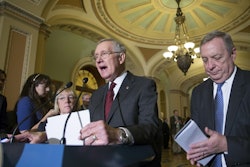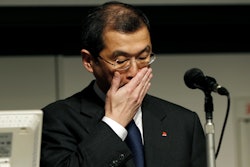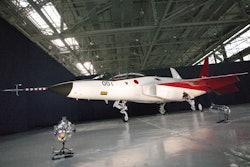BUSINESS-01
Earnings Fall Short; EU Toughens Taxes for Multinationals. Aired 5-6p ET - Part 2>
Dos Santos, Maggie Lake>
prices. Amazon earnings fall short of expectations. EU tax stance on
multinationals shifting.>
Amazon; European Union>
(END VIDEOCLIP)
FOSTER: U.S. President Barack Obama has paid tribute to the astronauts who died in the Challenger shuttle disaster which was 30 years ago today. Millions of Americans watched on live television as the shuttle exploded shortly after takeoff, killing all seven onboard. Mr. Obama urged the country to honor their legacy and sacrifice and heroism. With the strokes of two pens, Iran and France agreed to $16 billion worth of deals. You're looking at the signing ceremony in Paris. The Iranian president arrived in the city after a deal-making tour in Rome. Hassan Rouhani made it clear Iran's doors are open for French companies.
(BEGIN VIDEOCLIP)
HASSAN ROUHANI, IRANIAN PRESIDENT, VIA INTERPRETER: We have gathered here to say that France is once again ready to get involved in economic and developmental activities in Iran with new energy and greater motivation within the framework of the policies pursued by today's Iranian government. And we have come here to welcome all investors and business leaders to get involved in Iran.
(END VIDEOCLIP)
FOSTER: Well President Rouhani has already secured deals with some of the giants of French industry. Iran plans to buy 118 jets from Airbus, including a dozen A380 super jumbos. Total will buy Iranian crude oil and study the Iranian oil industry. And Persia was teaming up with an Iranian automaker. The French automaker plans to invest up to $436 million and says new cars could roll off Iranian production lines in 2017. The return of European auto giants to Iran could be a boon to the nation's car industry. It's basically been dormant for years. [16:35:01] Senior international correspondent Fred Pleitgen went to Tehran- based Radiator Company which hopes to see big profits.
(BEGIN VIDEOCLIP)
FREDERIK PLEITGEN, CNN SENIOR INTERNATIONAL CORRESPONDENT: Radiator Iran is one of the largest car suppliers in the Islamic Republic. They're proud that sanctions never stopped their production and say they believe their products can compete with any radiators in the world. Nassar Norsada (ph) has been working here for 2 years and says he's never been more optimistic.
NASSAR NORSADA, (ph) RADIATOR IRAN WORKER, TRANSLATED BY PLEITGEN: "We're so happy about the nuclear agreement," he says, and I think it will not only be good for us, it will be good for them as well.
PLEITGEN: The sanctions forced Iran Radiator to source most of its raw material like aluminum from inside the country. The boss believes the company will be able to buy such goods from all over the world, making production must cheaper, and more importantly, they'll also be able to sell their radiators globally.
UNIDENTIFIED MALE, TRANSLATED BY PLEITGEN: "Foreign companies are interested in us for two reasons," he says. "Quality-wise we can compete with them but our prices are also much lower. So, yes, there is a lot of interest from abroad."
PLEITGEN: But in total, Iran's auto industry suffered under international sanctions. Old manufacturing machines led to quality problems that Tehran hopes foreign investment will fix. French auto giant Peugeot has announced a $435 million contract to return production to Iran. Only one of many big business deals inked during President Hassan Rouhani's visit to Europe. Iran will also purchase more than 100 Airbus jets. Tehran's message is clear - Tehran is open for business.
ROUHANI, VIA INTERPRETER: We have gathered here to say that France is once again ready to get involved in economic and developmental activities in Iran with new energy and greater motivation within the framework of the policies pursued by today's Iranian government. And we have come here to welcome all investors and business leaders to get involved in Iran.
PLEITGEN: The folks at Radiator Iran feel they are ready to compete on the international markets and are hoping the many new business deals between Iran and the West will soon also lead to more demand for their products. Fred Pleitgen, CNN Tehran.
(END VIDEOCLIP)
FOSTER: It's a record profit for Ford and shares are falling. Ford's stock ended the day down, off more than 1 percent. The automaker posted a pre-tax profit of nearly $11 billion and that was thanks to a rise in U.S. sales and improvements in Europe. The problem is the investors don't think Ford can pull that off again. Ford's chief financial officer Bob Shanks spoke with Maggie Lake and he insisted the skeptics are wrong.
(BEGIN VIDEOCLIP)
BOB SHANKS, CFO, FORD MOTOR COMPANY: Well our guidance says in fact that we will repeat that success. Our guidance says that we'll have a 2016 that is at least as good as if not better 2015's record results. I think the concern they have is around, you know, has the industry in the U.S. peaked. And we do admit and agree that industry volume won't go up as much in 2016 versus 2015, but it's at a very high level. We expect it stay there this year. And in fact, when we look at the leading indicators, we think it looks pretty good for 2017 as well.
MAGGIE LAKE, CNN INTERNATIONAL BUSINESS ANCHOR AND CORRESPONDENT: So I guess what investors are looking for the rapid growth, then it turns the attention overseas and there's a lot of concern. We had Tim Cook from Apple this week warning of extreme conditions unlike anything they have seen. What's your view of the global economy?
SHANKS: Well it's very bumpy and volatile, I agree with that. And it's different everywhere in the world. But when you look at our particular sector and our industry in China specifically, we do expect industry volume to be at least as strong as it was last year if not a bit stronger. We're off to a good start in January. The showroom traffic appears to be pretty good. So we're off to a good start and we think that it looks pretty positive for us. We expect Europe to grow modestly. And the only area where we're really expecting even increasingly tough conditions is in South America where the recession in Brazil is expected to get worse and in Argentina the new government's starting to restructure the government and the economy and that's clearly going to have some pain in the short-term. Bu overall we see the overall industry globally growing modestly in 2016.
LAKE: Are you concerned about the strong dollar?
SHANKS: Well, it's having different effects around the world, but I would say on Ford at a macro level, you know, if you look at last year, it only had a $250 million impact on the downside. But on the positive side - because it's all related - we had a $930 million improvement from lower commodity costs. As we look at 2016, we think we'll have less positive tailwinds from commodities but they'll still be - they'll still be there. And maybe a bit more headwinds on exchange, but that is still positive for us.
LAKE: Yes, that's a great point. There is always a flip side to that people can benefit from. I want to finish by talking about Europe a little bit more. You mentioned that -
SHANKS: Yes.
LAKE: -- as a bright spot. First profit in quite a few years there. Is it just that the bleeding has stopped or are we seeing real recovery?
[16:40:10] SHANKS: Well we're seeing real recovery just as we saw in the U.S. You know, the U.S. industry came back faster than the overall economic growth was. We're seeing a similar story played out, particularly in the Euro area of Europe. So if you look at 2015, the results were driven by quite a strong growth in the overall industry, excluding Russia. And then we had, you know, great performance from out new products, we had favorable pricing, we had favorable mix and we had favorable cost performance. So, it's a combination of, you know, good news in the external environment but also, you know, things that we did and that we brought to the business as well. But overall, first profit since '11 as you mentioned.
(END VIDEOCLIP)
FOSTER: I want to bring you some breaking news that's just come in to CNN. The U.S. believes North Korea may have tested the components of a hydrogen bomb earlier this month. It follows a review and analysis of latest intelligence after a reported test by Pyongyang on January the 6th (ph). The U.S. still doesn't accept North Korea's claim it tested a fully- functioning H-bomb, but an official says there may have been a partial failed test. We're returning to the auto world though. While Ford's profits surged, America's biggest car retailer saw profits fall 16 percent. AutoNation resorted to offering deep discounts to keep cars moving off its lot, which in turn cut into profits. So joining me now is Mike Jackson, he's the chairman and CEO and president of AutoNation. Thank you so much for joining us. You're also having to reduce the number of new cars you buy in.
MIKE JACKSON, CHAIRMAN, CEO AND PRESIDENT, AUTONATION: Max, good evening, how are you? Yes, the fourth quarter was challenging. We went into it expecting the growth streak to continue. We had the inventory, we spent the marketing dollars. But it was clear the American consumer was not willing to do that and the numbers which achieved which are relatively flat on a unit-buying basis, were only achieved with significantly higher discounts from us and from the manufacturers. So that leads me conclusion to say, you know, vehicle volume in the U.S. has plateaued at a very high level - near record levels. But this streak of six years of dramatic growth has probably ended and now the industry has to manage for quality and not just rely on overall growth for its results.
FOSTER: And some interesting dynamics within the market because trucks and SUVs actually doing quite well which are traditionally expensive to run. But not at the moment of course because gas prices are low.
JACKSON: Well, you know imagine we have gasoline prices in the United States at $2 a gallon. It's unbelievable, and the American people have observed for the past couple of decades that whenever there's unrest in the Middle East, gasoline prices spike up. Well this past year, the Middle East is a bigger mess than ever and gasoline prices are going down. So the American consumer has concluded that gasoline is going to be cheap for a long time and they just love trucks in America. They love the high seating position, they love the space and the size. So the American consumer is stampeding to trucks. In December, fully 60 percent of all vehicles sold were trucks. Now, this is very good for Ford, General Motors and Chrysler - that's their strength, for the Asians which have strength in fuel economy. The American consumer is not as interested and we also had challenges in premium luxury - most likely related to the volatility in the stock market that we've seen as of late.
FOSTER: But in terms of the broad market, you say it's peaking to a certain extent. But do you think it's also playing into the idea that people are holding on their cars because they're uncertain about the future. So that market might come back in a few years, once confidence comes back.
JACKSON: Well, I don't like the word peak because that implies you're at a pinnacle and you're going to then go down the other side. I prefer the word plateau. You know, this industry can sell over 17 million vehicles for years. We still have tremendous replacement need that has still not caught up from the great auto depression of '08, 09, and '10. The average age of vehicles on America is an astounding 11.5 years. So they still - we still - have significant replacement need. So we've plateaued at a high level, and if the industry manages it well, it can do that quite profitably.
FOSTER: OK, Mike Jackson. Appreciate your time. Thank you very much, indeed for joining us.
[16:45:02] JACKSON: Thank you.
FOSTER: Now, while Nigeria is Africa's top oil producer which meant big problems when crude prices fell there, the finance minister though reveals lessons learned about the nation's oil dependence.
(COMMERCIAL BREAK)
FOSTER: Now Nigeria's president Muhammadu Buhari says he will not devalue the nation's currency. The naira is suffering after oil prices plummeted, eroding Nigeria's finances. The country is Africa's top oil producer. Speaking to us at Davos, the finance minister told Richard the fall in crude prices has revealed heaps of problems within the Nigerian economy.
(BEGIN VIDEOCLIP)
KEMI ADEOSUN, NIGERIAN FINANCE MINISTER: The oil price decline has exposed some vulnerabilities in the growth that we had actually seen over other years. And really that growth wasn't sufficiently inclusive and it didn't build enough resilience in the economy to protect us against what we all knew was a big risk, which was that the oil price would move against us. And it now has and I think it's exposed those vulnerabilities, and as you said correctly, we're facing challenges. What we've chosen to do is sort of reverse engineer and look at where do we want Nigeria's economy to be? And I think one of the first things we've identified is we never again want to be so vulnerable to the oil price. We actually want to be far more resilient, we want to be far more diversified so that we're not as vulnerable to these market changes. We're a big economy outside of oil, and that's what we really want to focus on.
RICHARD QUEST, CNN INTERNATIONAL ANCHOR AND REPORTER HOST OF "QUEST MEANS BUSINESS" SHOW: You're a big economy outside of oil except when it comes to government revenues.
ADEOSUN: Absolutely - that's the big challenge. So oil is 13 percent maximum of our GDP, but it's 70 percent of government revenue. So my challenge is looking at that other 87 percent of GDP and explaining and understanding why is it such a small contributor to government revenue. And so we're improving our revenue coverage, we're improving our revenue collection strategies, we're improving our efficiencies around non-oil revenue and bringing that into the government coffers.
QUEST: So whilst you're dealing with the high finance level of actually understanding the macroeconomic and macroprudential - mechanisms, if you like, or structures of your economy - you have to deal with some very real poverty issues and some very real issues. For example, subsidies -
ADEOSUN: Yes.
QUEST: -- which I realize you're saving on hugely -
ADEOSUN: Yes.
QUEST: -- as a result now and you have not having -- of having lower oil prices.
ADEOSUN: Yes. I mean, as I said, it's all about having a vision for the economy and where we see it. And we need more inclusive growth as you've said. We grew - the GDP grew - but inequalities grew. And what we've seen with the troubles that we've had, social troubles in the Northeast, and so that produces its own vulnerabilities which actually will come back to destabilize the economic system. So we need to fix that. So there's a range of measures in this budget that are around building infrastructure, which we think helps to grow the economy - the wider economy - sorting out power, sorting out transport -
QUEST: Ultimately, everything you've said I can hear the IMF going, 'Yes, excellent, absolutely!'
ADEOSUN: (LAUGHTER).
QUEST: 'We thoroughly agree with all of this.'
ADEOSUN: Oh, dear.
QUEST: But how do you stay on track with it, particularly in an economy like Nigeria where - I shall be blunt in this sense - where corruption is endemic?
ADEOSUN: Well it's not just a change of party, it was a change of philosophy. We have a leader now that is absolutely committed to anti- corruption. He's absolutely, resolutely committed to cleaning up corruption in Nigeria. [16:50:01] And we're doing on the economic side is supplementing that with improved efficiency. So those are the two biggest problems we've had in our economy. They're the reason why we don't have a lot to show for our oil. What wasn't stolen was wasted or not invested the way it should have been. So if we put those two forces together, we think we can reposition Nigeria's economy and come out much stronger.
(END VIDEOCLIP)
FOSTER: Nigeria's finance minister speaking to Richard last week. Now, life as a DJ is proving to be a lucrative career for some. Next, a look inside the multi-billion dollar industry booming, more by the day as well.
(COMMERCIAL BREAK)
FOSTER: House, ser (ph), garage, jungle, grime - it's the music that's got clubbers breaking a sweat and some DJs dancing all the way to the bank as well. The electronic music industry is now worth more than $6 billion worldwide would you believe. And tonight we're featuring the current crop of superstar DJs. Supposably Calvin Harris came in 17th in last year's "Forbes" celebrity rich list, just behind tennis ace Roger Federer. Our Claire Sebastian goes to DJ school to find out how it's quickly spinning into a lucrative industry, part of our special look at music trends in the digital age.
(BEGIN VIDEOCLIP)
CLAIRE SEBASTIAN, CNN PRODUCER: Watching in advance DJ class at New York Scratch Academy is a bit like learning a new language.
DAN CHAVEZ, "DJ DIRTY DIGITS": I can break/bring (ph) it down to like any sort of small loop. Loop like 1D, this for him is the loop button right here.
SEBASTIAN: And all of that looping, spinning and scratching is not just for fun. At just 17, Dante) hasn't yet finished high school and is already making $150 an hour as a DJ.
DANTE PERALLA, ASPIRING DJ: I do block parties, Sweet 16s, birthday parties, baby showers. From all my gigs I saved up to come here. You'll see this same encoder is going to move these right here
CHAVEZ: You'll see this same encoder is going to move these right here too.
SEBASTIAN: Scratch Academy teaches around 180 students per semester, many of them like Dante hoping to turn this into a career. The rise of DJing has gone hand-in-hand with the rise of electronic dance music - EDM. In 2014 the industry was estimated to be worth almost $7 billion - up 12 percent from the previous year. More than half of that total came from people paying to see a DJ at a festival or club. Gone are the days where DJs were mere record collectors confined to a dark corner of a nightclub. Nowadays these are the rock stars of their age and their success is enough to make your head spin Last year Calvin Harris was the top-earning DJ according to "Forbes Magazine," earning $66 million. High-profile endorsements and collaborations with A-list musicians helping propel him to the top spot. In second place, David Guetta brought in $37 million and in third place DJ Tristo scratched together a mere $36 million. So as more and more people are trying to crack this market, it's time to find out how it's done.
CHAVEZ: So this is going to be called the baby scratch. This is the first thing anybody learns here. Whenever you feel like you're ready, let her go. We could play it for our audience.
SEBASTIAN: All right.
CHAVEZ: That was great.
SEBASTIAN: While at Scratch Academy, students learn on traditional turntables, with technology nowadays there are many other ways to teach yourself.
CHAVEZ: There are CD turntables, there's controllers. You know, I even have people who come in here and they have a little app on their tablet.
[16:55:06] SEBASTIAN: After the baby scratch -
CHAVEZ: -- and three and four.
SEBASTIAN: -- there's the scribble scratch and the drag scratch.
CHAVEZ: Here we go.
SEBASTIAN: And then the real test.
CHAVEZ: So as we go now, --
SEBASTIAN: Yes.
CHAVEZ: I'm going to - we'll try to get this one in time with that one.
SEBASTIAN: Oh, God. OK. While clearly none of this is easy, the appeal is plain to see. A rock star profession where anyone can start from scratch. -- and one --
CHAVEZ: Very nice drop.
SEBASTIAN: Claire Sebastian, CNN New York.
CHAVEZ: There we go. That was a successful transition (inaudible).
SEBASTIAN: Yes?
(END VIDEOCLIP)
FOSTER: Now that's Claire Sebastian learning a little bit more about the music industry. We'll be back with a final check on the markets in just a moment for you.
(COMMERCIAL BREAK)
FOSTER: A final check of the markets for you before we go. Rising oil prices pushed U.S. stocks to their solid gains that you can see there. Dow ended up 125 points. Amazon shares though fell as much as 14 percent after trading stopped before bouncing back a little bit. They're now off around 3 percent. The onsite online retailer reported a major miss in earnings for the fourth quarter. Microsoft shares those surged after the company reported results that were actually better than expected. In a statement, Microsoft's CEO touts the success of the company's cloud business. In Europe, stocks closed in the red. All the major indices ended lower as investors reacted to some poor results from the Eurozone. Deutsche Bank shares fell after the bank reported its first full-year loss since the financial crisis. The Dax down nearly 2.5 percent. That is "Quest Means Business." Thank you for watching. I'm Max Foster in London.
END
(Copy: Content and programming copyright 2016 Cable News Network, Inc. ALL RIGHTS RESERVED. Copyright 2016 CQ-Roll Call, Inc. All materials herein are protected by United States copyright law and may not be reproduced, distributed, transmitted, displayed, published or broadcast without the prior written permission of CQ-Roll Call. You may not alter or remove any trademark, copyright or other notice from copies of the content.)






















